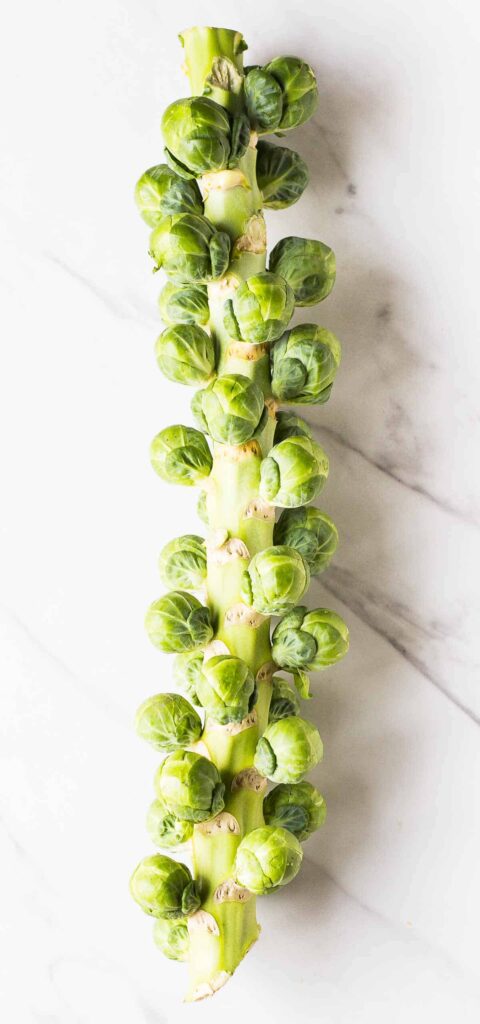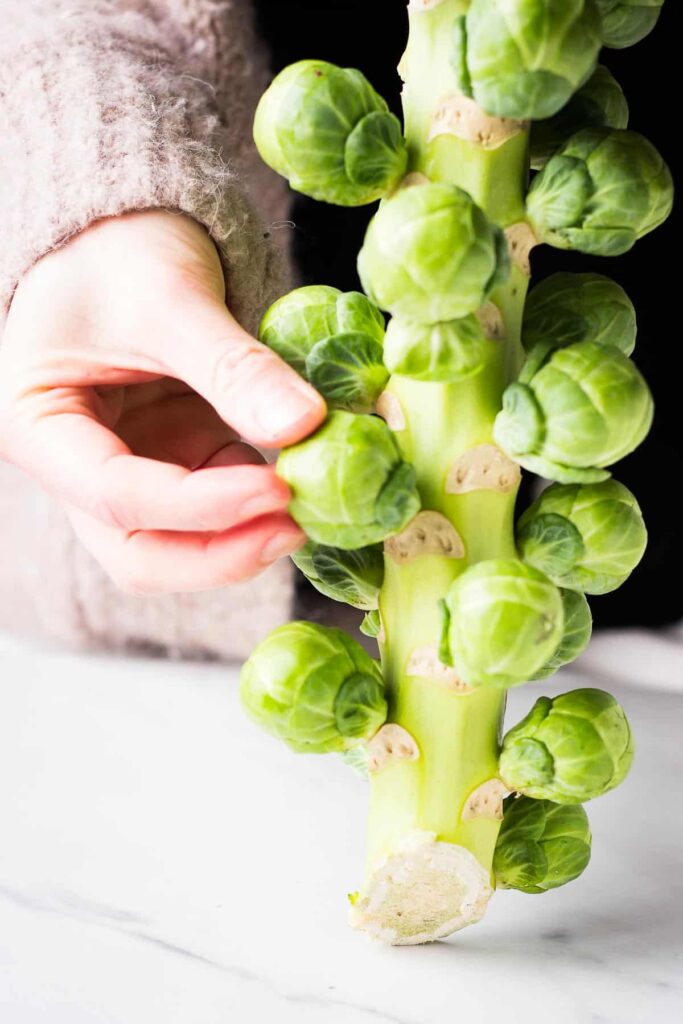Green little nutritional powerhouses – Brussels sprouts are packed with vitamins, minerals, antioxidants and phytonutrients that can have great benefits on your overall health! And they’re really delicious too!
Brussels sprouts – nutritious and delicious
Brussels sprouts are a vegetable that people either love or hate. And if you belong to the latter camp, please give them another go because they really do taste divine when prepared right AND they truly are real little nutrition bombs as they’re packed with vitamins, minerals and phytonutrients!
These green mini cabbages are a part of the Brassica oleracea family and are cousins with cabbage, broccoli and savoy cabbage. Records of Brussels sprout consumption can be traced far back and the name is believed to be derived from where it was cultivated – Brussels.
Brussels sprouts grow on a stalk, and each stalk has a quite a few individual sprouts growing on them. The season for brussels sprouts spans from November to February / March. They can handle frost and it’s even said that they taste better after they’ve been frostbitten!

Brussels Sprouts Nutrition Facts
Like with most vegetables in the Brassica oleracea, Brussels sprouts are packed with nutrients! Brussels sprouts nutrition profile shows that they’re a good source of:
- Vitamin C – This vitamin is essential for tissue repair in the body and the production of cartilage and tendons. It also helps with the absorption of non-heme iron, the type of iron found in plant-based foods such as Brussels sprouts!
- Vitamin A – Vitamin A is important for healthy eye sight and supports night vision! Also essential for skin maintenance and repair! Vitamin A also supports the immune system.
- Vitamin K – This vitamin is important for blood clotting and also has an important part in maintaining good bone health!
- Vitamin B6 – Also known as pyrodoxine. This B-vitamin plays a role in the formation of red blood cells, the metabolism of carbohydrates in the body. It also important for healthy hair.
- Folate – This vitamin is important for several processes in the body, such as for the production and maintenance of new cells in your body. It’s also a key player in the production of red blood cells, which transports oxygen from the lungs to all the cells in the body and helps you stay energised and alert. And it’s a vitamin that’s extra important for pregnant women or women who plan be become pregnant.
- Iron – Iron is essential for the delivery of oxygen to the cells and muscles in the body. Iron is also important for other energy producing systems in the body.
- Copper – Important for several enzymatic reactions in the body and plays a big role in the body’s own antioxidant system. It’s also important for the metabolism of iron.
Brussels sprouts nutrition profile is impressive! But there are more to the humble little green mini cabbage.
As with the other members of the Brassica oleracea family, Brussels sprouts contain many phytochemicals that can bring plenty of positive health benefits! And the bitter flavour that some say that sprouts have? That’s thanks to the potential health promoting compound Brussels sprouts contain!
Some more Brussels sprouts nutrition and health facts
- May have anti-cancerogenic properties: Vegetables belonging to the brassica oleracea family are rich in sulphur containing compounds called glucosinolates. When consumed, these are transformed to other compounds such as sulforaphane and isothiocyantes. These compounds have been studied for their possible protection against various cancers from their anti-inflammatory properties and by their ability to induce cell apoptosis. They can also induce enzyme phase II which helps to break down xenobiotics, and through that potentially prevent carcinogensis.
- Can lower cholesterol: Test tube studies have shown that Brussels sprouts may have bile acid binding properties, which can help to reduce cholesterol levels by making the body excrete more cholesterol and may have a positive effect on cardiovascular health!
- Rich in antioxidants: Brussels sprouts are an excellent source of antioxidants such as vitamin A & C but also antioxidants kaemperfol and quercetin. Kaempferol possesses anti-inflammatory properties and can also support the body’s defence against free radicals. Quercetin may help to fight inflammation and infection in the body.
- Promotes skin health: Rich in antioxidants and essential vitamins and minerals, consumption of Brussels sprouts can help to keep your skin healthy. Vitamin C and copper are both important players in the production of collagen, which is one of the main structural proteins in the skin which keeps your skin firm and healthy!
- Can prevent premature ageing: Sulforaphane found in Brussels sprouts can prevent premature ageing as it can protect against UV damage by decreasing free radical damage.
- Supports the digestive system: Brussels sprouts are rich in dietary fibre which keeps your digestive system happy by encouraging regularity and by feeding the gut microbiota. Dietary fibre helps to keep your blood sugars stable throughout the day.

How to retain Brussels sprouts nutrition during cooking
The best way to cook brussels sprouts to retain as many nutrients as possible is to steam or sauté the sprouts in a pan! And make sure you don’t overcook the sprouts to retain nutrients.
Cooking the sprouts also increases their bile acid binding capacities
Eating brussels sprouts raw will retain more of the health promoting glucosinolates, as they’re more sensitive to heat and more of the vitamin C.
Bottom line: Both raw and cooked sprouts are good for you! So switch things up to get the best of both worlds!
How to cook Brussels Sprouts
Before cooking, prepare the Brussels sprouts by cutting them off the stem and remove any outer leafs that look a little bit disheveled.
Then you can either eat them raw – they are best enjoyed raw when they’re finely shredded. Brussels sprouts go well with something sweet to cut of any bitterness such as orange, apple or dried fruits.
Or you can steam, sauté them or add them to stir fries and dress them with olive oil and salt. Or you can even sautée them with a little bit of pancetta for extra flavour.
One important thing to note when cooking Brussels sprouts is to not overcook them! This is probably why many people don’t like them as overcooking them can make them taste (even more) bitter.
Serve the sprouts with a source of fat, such as an oil dressing or nuts, as the fat will helps with the absorption of the fat soluble vitamin A &K found in Brussels sprouts.
Recipes with Brussels Sprouts
Now as you learnt more about Brussels sprouts nutrition facts and how to cook them, below are a few recipes to get you going!
- Brussels sprouts crisps – If you like kale crisps you’ll love these!
- Shaved brussels sprouts salad – This salad has orange, cranberries, pumpkin seeds and is dressed with a lovely orange vinaigette! A great winter salad!
- Teriyaki Chicken Stir-Fry with Brussels sprouts
If you have any questions, don’t hesitate to leave a comment and I will get back to you as soon as possible
